#Pulitzer Prizes
Text
Quando la Scienza è fatta di chi è privo di Etica.

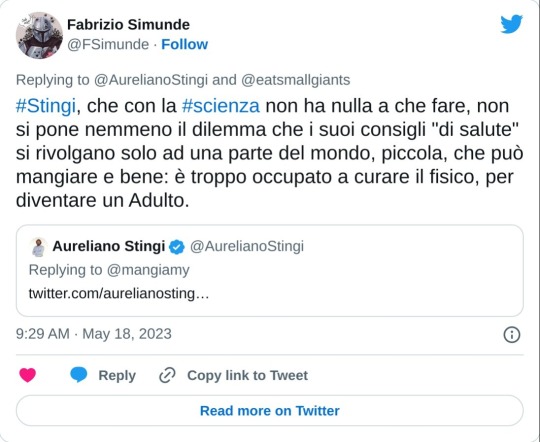


Questa totale mancanza di etica (il rivolgersi ad un pubblico di soli privilegiati, consapevoli che la "fame nel mondo" è reale), dimostra che le università italiane rilasciano lauree scientifiche con lo stesso principio della raccolta punti al supermercato.
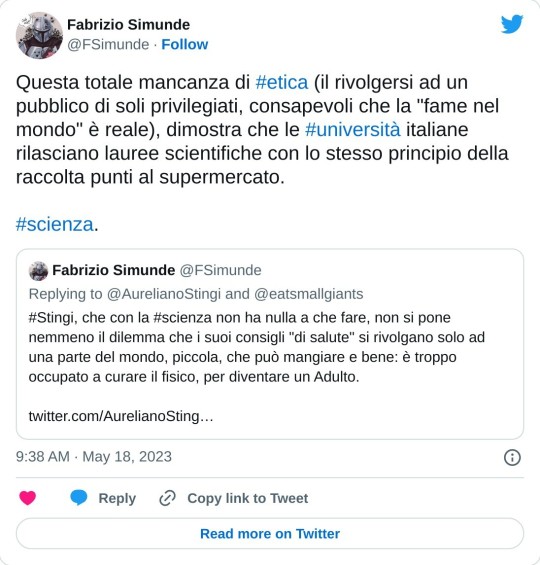
Non è assolutamente difficile prendere un Pulitzer Prizes analizzando dialoghi e comportamenti della scienza italiana, dato che la mancanza di etica evidente nei suoi "esponenti di punta" mostra che c'è ancora molto da lavorare affinché la scienza sia davvero autorevole.

3 notes
·
View notes
Text

June 4 1917
The first Pulitzer Prizes were awarded, with the winners selected by trustees from Columbia University.
The winners included:
Laura E. Richards, Maud Howe Elliott and Florence Hall in biography or autobiography for Julia Ward Howe
Jean Jules Jusserand in history for With Americans of Past and Present Days.
Herbert Bayard Swope in reporting for article series " "Inside the German Empire" in New York World
New-York Tribune in editorial writing for an editorial article on the first anniversary of the sinking of the Lusitania
Photo: The New York Tribune‘s front page the day after the sinking of the Lusitania. May 8, 1915.
The Lusitania Anniversary (1916) here: https://en.wikisource.org/wiki/New_York_Tribune/1916/The_Lusitania_Anniversary
#Pulitzer prizes#June 4#1917#New York Tribune newspaper#first anniversary#sinking of Lusitania#front page#article#history#WW1
0 notes
Text
1917-1st Pulitzer Prizes awarded
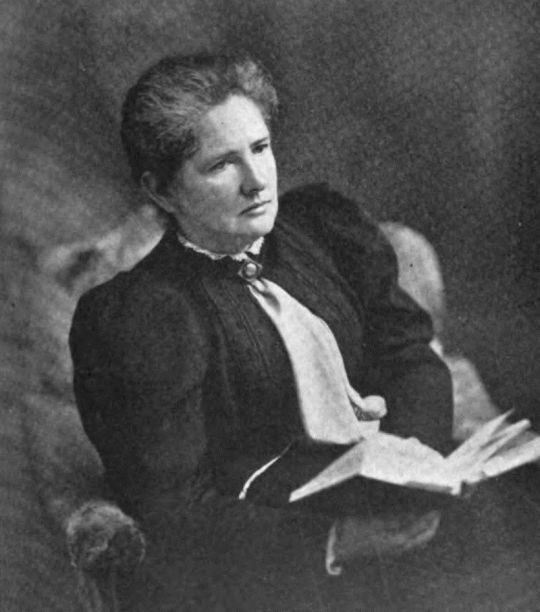

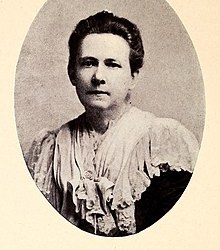
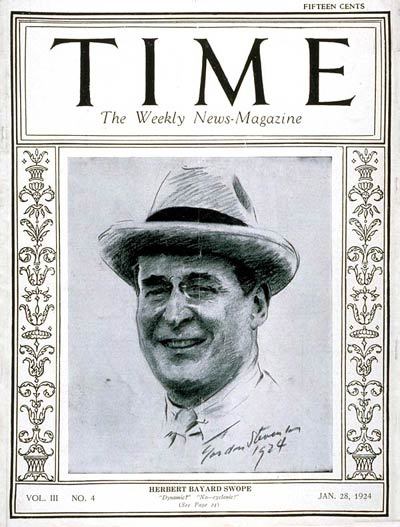

Laura E. Richards, Maude H. Elliott, and Florence Howe Hall receive the first Pulitzer for biography (for Julia Ward Howe). Jean Jules Jusserand receives the first Pulitzer for history for his work With Americans of Past and Present Days. Herbert B. Swope receives the first Pulitzer for journalism for his work for the New York World.
0 notes
Text
FOTO-FOTO PEMENANG HADIAH PULITZER 2009
FOTO-FOTO PEMENANG HADIAH PULITZER 2009

View On WordPress
0 notes
Text
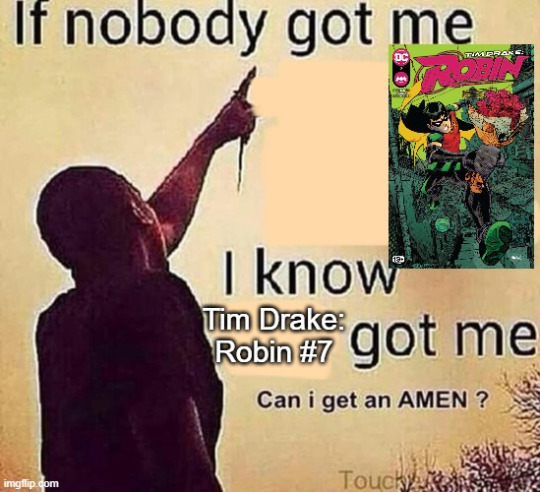
TIM DRAKE: ROBIN #7 YOU WILL ALWAYS BE FAMOUS
#this comic won a pulitzer prize in my house#when they told us that it would be bernard pov.... chills#and then the actual contents of the book???#i think i went insane as i read it#genuine changed my brain chemistry#OH MY GOD WHEN WE THOUGHT BEAR WAS GONNA PROPOSE???#AND THE NECKLACE!!!! THE FUCKING NECKLACE!!!#sorry i'm going feral just thinking about it#td:r#tim drake: robin#bernard dowd#tim drake#timbern#dc
276 notes
·
View notes
Text

#juliana canfield#arian moayed#succession#AN EVENING WITH JESS JORDAN PULITZER PRIZE WINNER OF ROY TOY NO MORE#feat. stewy's lube advertisment#q
559 notes
·
View notes
Video
fathambway: See what makes #FatHam so f*$%ing special. 👑 Watch our “Creep” music video performed by Marcel Spears and the cast of Fat Ham.
#posting this for me honestly#nothing but respect for MY pulitzer prize winner#if anyone has wondered where i've been. it's at the american airlines theatre#fat ham#fat ham broadway#marcel spears#congrats to radiohead on their broadway debut!
438 notes
·
View notes
Photo


funny 'cause i couldn't have called it
#yea their narrative deserves a pulitzer prize#jamie drysdale#trevor zegras#*mine#anaheim ducks#hockeyedit#anaheimducksedit#nhledit#sportsedit#jamiedrysdaleedit#trevorzegrasedit#hockey#ducks
408 notes
·
View notes
Text




This man is utterly, utterly loathsome and racist.
He also has three Pulitzer Prizes. Which says it all.
#free palestine#muslims#nyt#pulitzer prize#journalism#democrats#republicans#politics#middle east#iran#iraq#usa#animal planet
108 notes
·
View notes
Text
So someone sent me an anon ask saying something like “well you’re terrible at writing so maybe you should stop and get a new hobby” I don’t want to bother publishing the ask (already blocked and deleted oop) to give attention to it but one thing about it kind of stuck with me. My question for people with this thought process…. do you…..do you think you have to be “good” at something for you to be ‘allowed’ to have it as a hobby? My dudes..hobbies are about doing things you enjoy… for you and you alone…. it has nothing to do with being arbitrarily ‘good’ or not friend.

To anyone worried about not writing / drawing / whatever else because you aren’t good at it, you don’t have to be! life is about creation and fun and finding joy in the things you do and where you are
#much love#my thoughts#two mad anons in a month after being on here for……………. 12 years?#hobbies by nature are meant to be enjoyed not necessarily anything you are ‘good’ at#plus how else would you improve at something? no one is born a extremely talented amazing photorealistic artist#or a Pulitzer Prize winning author or whatever else#you work at things and improve over time#I love looking back at my fics from 2012 on and being like WOW look how much I have grown!!!!!!#mwah it’s like a time capsule#anyway#DO THINGS BADLY#DO THINGS OK#DO THINGS GREAT#do ALL THE THINGS#hobbies#mine#personal#anon hate#lol
58 notes
·
View notes
Text

William C. Beall ~ Pulitzer Prize. 1958
102 notes
·
View notes
Text
after what Aabria said about the Dictator having flat teeth in the front and back, and the preview shot of a stoat in a gas mask, I’m starting to get SERIOUS Animal Farm vibes. The animals in charge becoming human-like (in animal farm, the pigs living in the house and walking on hind legs; in burrows end, the first stoats having molars, wearing gas masks) as they take on the role of the thing they sought to destroy. And given the Soviet era influences I don’t think it would be that much of a leap.
#dimension 20#burrow’s end#burrow’s end spoilers#burrows end spoilers#holy fucking shit#No matter what happens next week I just have to say for the hundredth time… AABRIA! FUCKING! IYENGAR!!!!#Nobody is doing it like her. This is without a doubt the most incredible season of any show I’ve ever watched#it’s just insane and to do it all in a format where the most important moments are up to chance!#jeeeeeesus h Christ#Aabria if you’re reading this i am sending you a million roses thru the internet#number one DM in the game and THATS THAT#Where is her Nobel prize???!!! Where is her Pulitzer!!! Where is her presidential medal of freedom?!!!#is it Wednesday yet?#aabria iyengar
133 notes
·
View notes
Text
Yet for all the “Wait, are they actually gay?” gags, the show is admirably committed to something more serious: the notion of Sherlock/Watson as both True Detective and True Romance. This is a real love affair, not a joke one.
It’s also a central shift from the original: Sherlock is still a detective, there are episodic mysteries, there is still Baker Street (now equipped with Web access), but the subject of the show is not so much Sherlock’s deductions as this relationship, which is itself a kind of mystery. Sherlock and Watson are best friends, certainly. They’re also chaste boyfriends, as well as a captain and his first mate. Mostly, though, they’re a god and a mortal, mutually besotted—the most impossible love affair of all.
From Fan Friction, by Emily Nussbaum in The New Yorker, January 19, 2014
77 notes
·
View notes
Text
Welcome to Belleview - Chapter 1
Notes: ~11 years after the beginning of The Fighter, this is not a Luke/Leo story but is in-universe.
TW: Institutionalized slavery, nonsexual nudity, starvation mention, human euthanasia mention, degrading language, all the things.
✥ ✥ ✥
From the outside, it is a beautiful campus. Elegant in its simplicity, with three brick buildings forming a crescent at the mouth of a long, rose-bush lined drive that intersects wrought iron gates.
Today, police swarm it, more for the optics than anything else. They’re not here to enact change, or to start building moral credit, but they are here, and so he smiles, shakes hands, introduces himself.
He opens the double-paned glass door, which sits just in front of a set of reinforced steel bars, and he’s immediately met with the silence of a reception area from which all of its workforce has been escorted out.
Almost all.
“Lincoln Prescott?” says a singular man, in his mid-twenties on his best day, peeking around the corner. He’s nervous, skittish even. Fidgeting palms run down his sweater and he smiles, but it’s not the smile of someone who’s happy, welcoming, comfortable, warm.
Lincoln returns the gesture and nods. He doesn’t extend his hand. Instead, he turns over the key he’s just been handed, and he reads the man’s name-tag.
Jared Fisher, Handler. Level Two.
Jared smiles sheepishly and takes off the name-badge. “I wasn’t sure if I should wear it. I guess… I guess it’s not really needed anymore.” He holds it out to Lincoln, who stares at it for several seconds, before he sets it on the counter behind him.
“Uh,” Jared says, cutting through the silence of the massive waiting area. “I’m sorry. I know, I’m sure, that you’re not– I get it, I mean. I know I’m the enemy here.”
Lincoln narrows his eyes, shaking his head once.
“They said if I– Uhh, they said they’ll take it into c– consideration, I guess. When the trials start. When… whatever is going to happen, happens.” He swallows, and Lincoln feels something that is related to sympathy, but not quite it. He lets that feeling fizzle quickly. “I didn’t mean to hurt anyone.” Jared says quietly.
There’s silence again. Lincoln lets it settle over him, watching the ex-handler’s fidgeting intensify, before he says, “Oh. You’re waiting for me to speak.”
Jared shrinks.
When the final nail in the coffin of support for the trade and consumption of government-sanctioned slavery had been hammered in, there wasn’t the type of frenzy that anyone expected. That morning, people, by and large, woke up, had their coffee, showered. They caught their trains to work, they read their news and they watched, closely, but there wasn’t an uproar. They stole glances at their phones and monitors for updates, for news, for what happens next.
Truth be told, it had been heading this way for a while. Within the last ten years, Individual states had begun passing legislation that, in hindsight, paved the path for widespread challenges to the system, led by a few congresspeople who finally woke the fuck up. Things turned violent early, with protests, rallies, boycotts, demonstrations… everything imaginable.
Videos of workers being tortured, followed by videos of workers recounting their own stories, began making national headlines. Consumers of workers’ labor fought hard to sway public opinion back to the positive outcomes the system had brought the country, but with each passing week, with each new video of a worker strapped to a table being violated in unimaginable ways, it was a losing battle.
As local legislation was passed, certain states became a kind of safe-haven for runaways. And eventually, things started going federal.
The most significant bill, the one that fully outlawed the use of worker labor and reinstated the ‘freedom’ of current workers, was going to be codified that morning. It wasn’t unexpected, at that point, but still, the infrastructure, the plan, was… well, it had holes, to say the least.
The workers who were deemed functional, by some arbitrary metric, would be relocated to massive government-owned housing units. They would share rooms by the half dozen, be fed, given medical attention, and slowly be reintegrated into society. No one knew exactly how that would work, but it had been successful in the states that had already outlawed worker labor (with some notable exceptions), so the plan, half-assed as it was, was set into motion.
Former safehouses were repurposed as halfway houses for those who were less “independent.”
Individual volunteers were gathered who would open their homes to those who were unable to care for themselves but didn't pose any significant safety or medical risk.
In the days leading up to the vote for reinstatement of worker rights, when it was clear how things were going to go, people did go into a frenzy. Hospitals scrambled to hire, doctor’s offices scrambled to modify policy, the call for volunteers to offer shelter, food, medical assistance, jobs… it was madness.
But that morning, the morning the final nail landed, it was quiet.
Jared leads Lincoln down a narrow hallway, spouting off information as he does. The linoleum tiled floor is clean, but peels around the edges. The walls are white, chipped along the corners and where the doorframes meet the drywall. The ceiling is white, but there’s a yellow cast. The fluorescent lights that line the halls give it a sort of eerie post-apocalyptic vibe, and it’s fitting.
The building, Belleview, is eerily quiet. There’s no obvious screaming coming from within, so it’s already better than he expected.
Jared slaps his keycard against a box outside a set of double doors, and Lincoln takes a breath. The volunteers are gathering outside by now. His group of nurses, doctors, caretakers. They could be with him, but he wanted this run-through alone. To give him time to make sure the plan that he spent the last week finessing would work.
Jared stops at the first door, and pushes a button outside of it, bringing to life a screen. There’s a name on the top, and Lincoln glances through the information he’s shown. Jared presses another button, and the door unlocks audibly, the light above it turning from red to green.
Inside is a man, with nothing else. Brown hair, blue eyes. He doesn’t look at them.
“This one can get aggressive.” Jared’s voice is matter of fact, as he points out the information on the tablet. “They come here to… you know, to be of whatever use they can be until they…” he whispers, and Lincoln offers him the briefest of glances. He regrets it immediately. “Expire.”
Lincoln turns his attention back to the screen, and so Jared continues. “We have 21, uh… residents, right now. I think that’s what we’re supposed to call them now. They were… well, you know. They were workers, but the rejects, I guess. They’re in… they’re in various states of um…”
Lincoln clears his throat tersely, throwing a warning glance to the ex-handler.
“Well, okay. I’m sure you’ve been briefed, and if not, I’m sure you will be.” He begins walking again, letting the last door close without another glance, as he approaches the next. “We tried to take as good of care of them as we could. They’re fed and watered and we tried to... whenever we could, some of us tried to offer them some comfort.”
He stops at the door. “Obviously, they’re here for a reason, so they don’t tend to be super… uh, super cooperative or trainable or anything. They’re usually just… they’re here for a short time, and then–” He stops himself this time, without the warning glance.
“We call this guy Tank, but I think his real name is Tyler, if that means anything to you.”
Lincoln nods. “Does it say here? Anywhere on here? What his name is?”
Jared fiddles with the screen for several seconds before it comes to a demographic page. It lists 20 inhabitants, and presumably, their room numbers.
“Look at that,” Jared says then, interrupting Lincoln’s review. “Looks like I was right, it is Tyler. That was a guess.”
Lincoln takes a breath, because there’s no benefit to causing a scene here. If Jared was offered leniency, then he was a handler who, at least on the surface, wasn’t as bad as he could have been.
“Anyway, this one used to be aggressive, too." The door opens and Jared gestures to the man who lays on his stomach, bandages across his back. "But now? Nothing going on in there.” He points to his own temples, and lets the door swing shut. He switches to the video feed, where Tyler stares into the camera.
Jared continues along to the next room, and Lincoln follows behind him, his thoughts racing.
Lincoln Prescott was already in his car on his way to the site he’d been assigned to oversee before they even finalized things in the White House. It’s a temporary solution to a very serious problem, they said. It would take ten to fifteen days to get those who were in no shape to get to a halfway house the medical attention they needed and find suitable placements for them.
In the meantime, they were safest where they were. He was needed to help organize the volunteers and medical personnel, and to act as a sort of director of the temporary housing facility.
So he drove. He knew it would be bad, maybe the worst of the worst. He had been briefed. He was given a stack of files of the inhabitants that he would be overseeing. He looked it over that night, and every night since then. He spent the last six days memorizing every face, every backstory.
It was a site to house those that the government had deemed unable to be placed, for one reason or another. Too violent, too unpredictable, too difficult to be trained. From what Lincoln could gather, these workers served any and all purposes. Their primary reason for existence was, it seemed, to trial training techniques, to trial drugs, to motivate the workers who were difficult, to show that there were worse fates.
They ranged in ages from 19-26. None survived longer.
“Doctor Prescott?” Jared asks, from somewhere far away. Lincoln looks up from the tablet, and Jared is already down the hall at the next door. Lincoln takes a breath, biding his time. They’ve gone through eighteen of the men, with Jared's special commentary on each of them. Twice, Jared had promised that he wasn't a bad person, and that the culture had been one thing, but now it was another, and he was ready to pivot.
Only once had Lincoln felt himself snap, and had to excuse himself before serious harm was done.
Some of the men were given the accommodation of a bed, some of them were given clothing, some had rotten food in their cells, some had broken bones, open wounds. Some slept fitfully, and some slept so completely still that Lincoln thought that they might not be alive at all. Jared had assured him, in those moments, that they probably were.
Jared opens the door to the twentieth room, with a small, “We call this one ‘Felix.’ I think you’ll like him,” as he does. The man, short blonde hair and dark brown eyes and at least forty pounds less than his frame should support, blinks himself awake. He sits in the corner of the tiny room and stares at Lincoln. He tries to smile, but the tremors that rock his body make it hard to buy. He doesn't wear any clothes, and has one of the DLS-issued shock collars affixed to his neck. His ribs shake when he breathes too deep, but again, he tries to smile, even as he backs further into the corner.
Jared is speaking to him, but Lincoln doesn’t clock exactly what’s being said. The man looks so afraid, but still, he lifts his fingers in a sort of wave, shaking as he does. Lincoln waves back, offering him a small smile in return.
“We’re not allowed to euthanize them,” Jared is saying.
“What?”
“When they hit the end, I mean. We have to give them enough food, give them enough water. If they choose to stop eating or drinking or… whatever, that’s on them. We can’t assist them. Once they’re too far gone, sometimes we’ll just stop trying to get them to eat, and let them go.”
He thought, by now, that he’d heard it all. His eyes widen. “Is that where we’re at with him?”
Jared shrugs. “He’s sick. The director said he’s gonna go any day now, but it’s better if we don’t directly cause that.”
Lincoln doesn’t attempt to keep the hatred out of his eyes.
“He knows,” Jared says. “They all do. Once we stop pulling them for testing, it’s only a matter of time. He wants you to pull him, though,” he continues. “He wants to know it’s not his time yet. He wants to show you he can still be of use. He doesn’t really speak anymore, but he tries to be sweet, so we will keep him in rotation.”
“Stop talking,” Lincoln says then, his fist in a tight ball but, remarkably, not around the man’s throat. Jared’s mouth snaps shut.
“Show me the last one, and then you’re finished here.”
As they retreat away from the man’s cell, the door closes behind them, and Lincoln watches the hope leave his eyes.
They make quick work of the last door, and the weasley man leads Lincoln back through the main wing, mumbling about how there were several wings they didn’t tour, but he at least got to see all the residents, and how if he has questions, he is more than happy to take a call, day or night, and how…
✥ ✥ ✥
The volunteers stand in a haphazard group, each with a color coded name-badge to at least give Lincoln a starting point as to their role. He begins by directing the doctors and nurses to rooms, providing instructions on how to access the rooms, providing instructions on how to access the medical files, providing whatever information he can.
They’re working on finding placements for each of these boys, he tells them. But they all require intensive, specific treatment. As they find placements, they’ll be housed, and once they’ve placed the last boy, the volunteers will be reassigned.
As the last of the volunteers heads inside to get their own bearings, Lincoln takes a step back, regarding the innocuous building.
“I guess that’s that,” Jared says from behind him, taking a step forward and extending his hand out once more. Lincoln looks down at it, shoving his hands into his pockets, as Jared mumbles, “Welcome to Belleview.”
UNTITLED SYSTEM COLLAPSE STORY TAGLIST: @pigeonwhumps @peachy-panic @whump-cravings
#belleview#institutionalized slavery#this is going somewhere#its going places#maybe not to the pulitzer prize people#but places#nonsexual nudity#torture mention#government stuff#it's a set up ok#they'll be sweet soft guys eventually
73 notes
·
View notes
Text
just finished reading the Age of Innocence and the last line that Archer speaks to himself, sitting on the bench outside Madame Olenska’s Paris balcony after not seeing her in almost 30 years has left me unwell.
“It’s more real to me here than if I went up.”
Cancel all my calls. I will be bedridden for several days. thanks.
#the age of innocence#edith wharton#Edith you monster. read those last few pages through TEARS. would not stop#american literature#classic literature#1920#1921 Pulitzer Prize winner#quotes#writing#newland archer you rat bastard!!! I hate you so much!#Madame Ellen Olenska has never done anything wrong ever#💗💗💖#I played myself.#I thought it wouldn’t end like this…#I wanna know more about her…was my lady happy after all those years? did she ever think about him? sobbing at her feet?#faaaack 🙃😭😭💗#words
49 notes
·
View notes
Text

Fifty years before social media, Robert Frost saw what was coming..
#Robert Frost#New England#American poet#poet laureate#Pulitzer Prize#US authors#literacy#sign of the times#USA#famous quotes#prophetic words#prescient#social media
99 notes
·
View notes